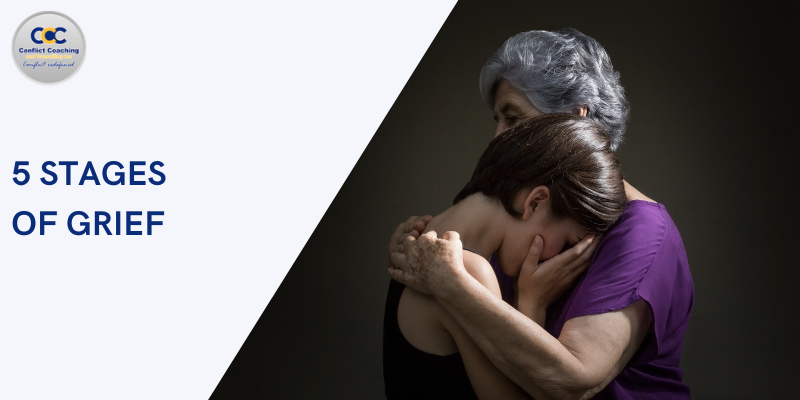
Five Stages of Grief: Denial, Anger, Bargaining, Depression & Acceptance
Grief is a combination of emotions that arise in response to loss, be it the passing of a loved one, the end of a relationship, or getting fired from a job.
In this blog, you will learn about the five stages of grief, including who is their creator, how each stage differs from the others, the duration of each stage, and whether grief follows a set pattern.
What are the Five Stages of Grief?
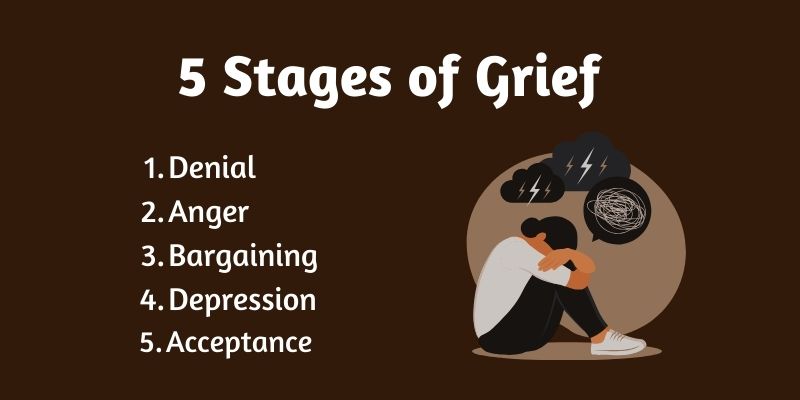
Elisabeth Kübler-Ross, a Swiss-American psychiatrist, conducted extensive research by working with terminally ill patients, and her observations led to the identification of the Kübler-Ross model.
The model talks about five stages of grief: denial, anger, bargaining, depression, and acceptance. She explained these stages in her book “On Death and Dying,” which came out in 1969.
The stages are a framework to understand the emotional responses individuals go through when facing impending death or dealing with profound loss.
Do the Five Stages Always Happen in Order?
Kübler-Ross emphasized that each stage represents a distinct emotional and psychological response, which means not everyone experiences these stages linearly or predictably.
Individuals may move back and forth between stages, skip certain stages, or revisit them differently.
It provides a valuable framework for individuals, caregivers, and mental health professionals to comprehend and navigate the complex terrain of grief.
List of the Five Stages of Grief
- Denial
- Anger
- Bargaining
- Depression
- Acceptance
1. Denial
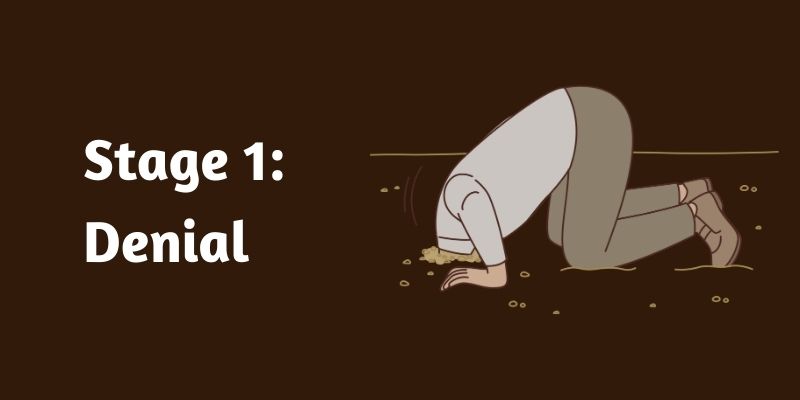
Denial is often the first emotional response in the grieving process, serving as a shield against the harsh reality of loss.
It’s a psychological defense mechanism that emerges when individuals struggle to accept the truth of their situation.
This can lead to a state of disbelief, where they may refuse to acknowledge the event or try to block out the painful emotions associated with it.
In denial, individuals may find themselves unable to comprehend that someone important is truly gone. Despite knowing in their minds that the loss has occurred, they may struggle to believe it in their hearts.
It’s common to feel the presence of the departed, to hear their voice, or even to see them, creating a sense of unreality.
This protective mechanism of denial allows individuals to gradually process the impact of the loss at a pace that their psyche can handle.
By temporarily shielding themselves from the full weight of the grief, they can ease into the acceptance of their new reality, one step at a time
2. Anger

Anger is a fundamental and understandable emotion that often arises after loss. When someone dies, it’s natural to feel a surge of anger.
Death can appear merciless and unjust, particularly when it feels untimely or when there were dreams and plans yet to be fulfilled together.
This anger can be directed outward, towards the deceased for leaving too soon, or inward, towards ourselves for perceived mistakes or missed opportunities before their passing.
In the aftermath of loss, anger can manifest in various ways. It may surface as resentment towards the person who has died, a frustration with the circumstances surrounding their death, or a deep-seated anger at oneself for perceived failings or unresolved conflicts.
This complex interplay of emotions highlights the multifaceted nature of grief and the intense emotions it can evoke.
3. Bargaining

Bargaining is a critical stage in the grieving process, marked by attempts to negotiate, make deals, or find compromises in a desperate bid to mitigate the pain of loss.
During this phase, individuals may grapple with a profound sense of vulnerability and a deep yearning for resolution. They may seek meaning in the midst of their suffering, trying to regain a semblance of control over their circumstances.
This often involves making promises to a higher power or engaging in hypothetical scenarios where the loss could be reversed.
Bargaining is a poignant expression of the human desire to find solace and restore order in the face of overwhelming grief. It reflects the inner turmoil and emotional struggle inherent in coming to terms with profound loss.
4. Depression
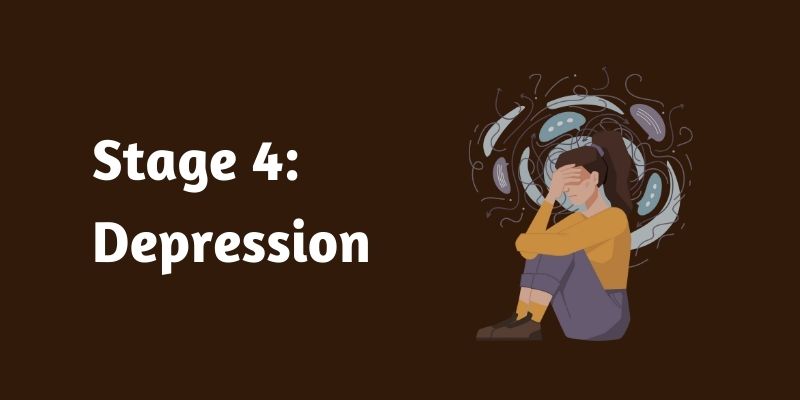
Depression marks a profound emotional response to the reality of the loss. It involves overwhelming sadness, regret, and a pervasive sense of despair.
During this stage, individuals may experience changes in appetite, sleep disturbances, and withdrawal from social interactions.
Depression in grief is a complex emotional state that reflects the deep impact of the loss on the individual’s emotional and mental well-being.
5. Acceptance
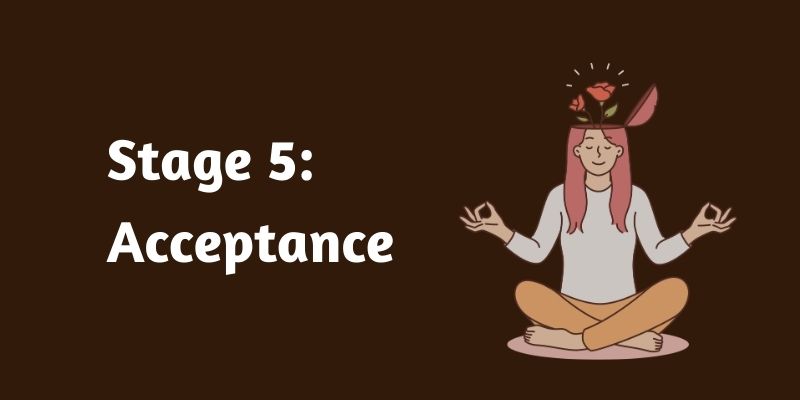
Acceptance, the final stage of grief, doesn’t imply the absence of sadness but rather a coming to terms with the new reality.
It involves a gradual understanding that life will continue, and the pain of the loss will transform into a more manageable form of sorrow.
Acceptance allows individuals to integrate the experience of loss into their lives, fostering a sense of resilience and enabling them to move forward while preserving the memories of what has been lost.
Frequently Asked Questions (FAQs)
What is the hardest stage of grief?
The hardest stage of grief varies for each individual. Still, many find that the depth of despair experienced during the depression stage can be particularly challenging.
How long does each stage of grief last?
The duration of each stage of grief has no fixed timeline. People may move through the stages at their own pace, which can take weeks, months, or even years.
Is it possible to repeat the five stages of grief?
Yes, individuals can revisit or experience the stages of grief more than once, and the process is often cyclical. Grief is a unique and evolving journey; people may move through the stages differently over time.
Conclusion
The five stages of grief, outlined by psychiatrist Elisabeth Kübler-Ross, provide a valuable framework for understanding the emotional journey of loss.
Denial, anger, bargaining, depression, and acceptance represent common responses to grief, though individuals may experience them in varying sequences and intensities.
Accepting the emotional turbulence accompanying grief is vital in fostering resilience. While the stages provide a framework, the journey is not bound by a specific timeline. Each person navigates grief in their way, and the duration of each stage is fluid.
By acknowledging the universality of grief while respecting its deeply personal nature, we open avenues for support, compassion, and healing.





Responses